Photo
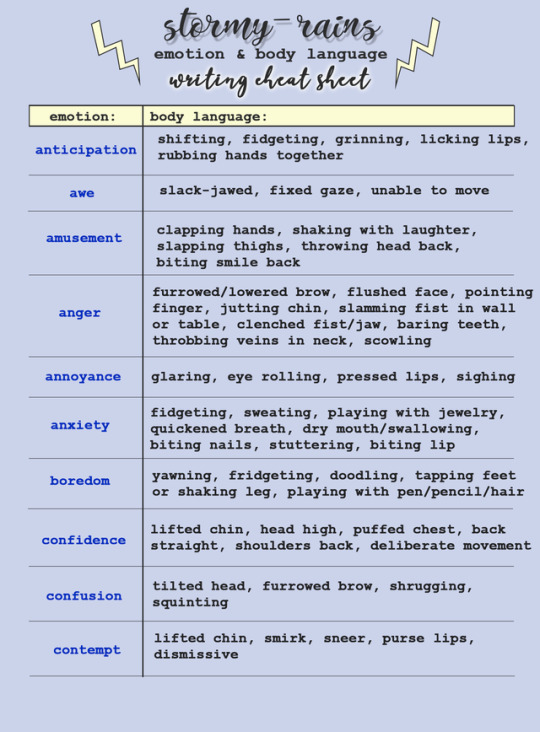
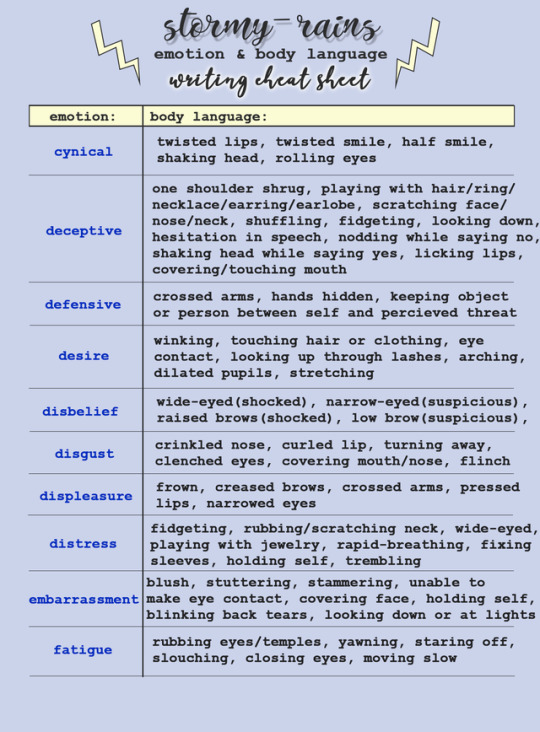
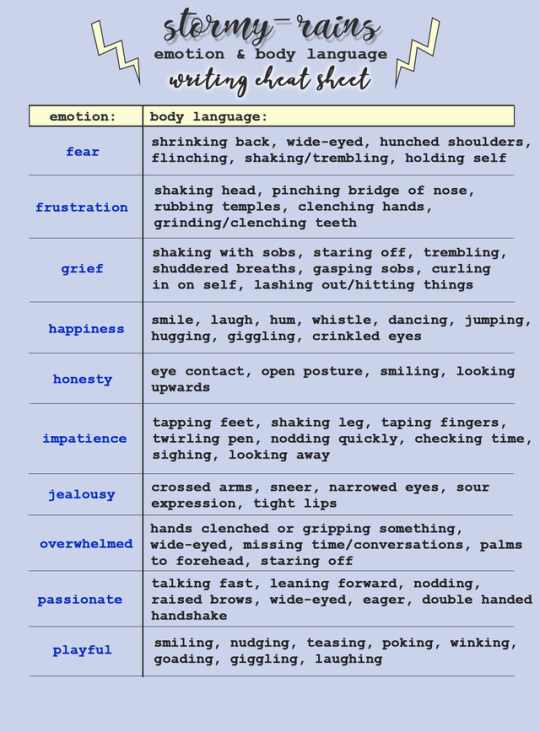

A Writing Cheat Sheet: for linking actions with emotions.
As always, click for HD.
53K notes
·
View notes
Text
Surnames Master Post.
Surnames are just as important as given names. So, I compiled a list of the websites I use to find my surnames.
English Surnames
Dutch Surnames
Spanish Surnames
Scottish Surnames
German Surnames
Italian Surnames
Irish Surnames
French Surnames
Scandinavian Surnames
Welsh Surnames
Jewish Surnames
Surnames By Ethnicity
Most Common Surnames in the USA
Most Common Surnames in Great Britan
Most Common Surnames in Asia
261K notes
·
View notes
Photo








DIY Guide to Fashion Terms and Wedding Dresses storymixmedia.
For my most popular style infogaphics go here:
Fashion Pattern Vocabulary Part 1 Infographic.
Fashion Pattern Vocabulary Part 2 Infographic.
Know Your Sunglasses Infographic.
Know Your Shoes Part 1 Infographic. Lobster Claws anyone?
Know Your Shoes Part 2 Infographic.
Know Your Necklines Infographic from Paper Blog.
Know Your Hats Infographic.
Know Your Collars and Cuffs Infographic.
Know Your Necklines Infographic.
Know Your Skirts Infographic.
Know Your Nail Shapes and What’s Popular on Instagram Infographics.
Know Your Eye Liners Infographic.
45K notes
·
View notes
Text
Weird tip for novel writers: give your readers a place to take a break.
We all know and love the feeling of being glued to a book. “One more chapter, one more page, one more paragraph.” But absorbing whole novels in 1 sitting isn’t the best. We forget loads of stuff that happen!! It just happens.
Every 5-10 chapters I leave it at a good stopping point. A character goes to sleep with no imminent threat waking them up, a good conversation ends with well wishes, a part of the story is wrapped up, and it’s a nice place to put the bookmark and close the cover.
This is good!! This isn’t a bad thing at all!! Some people only have the attention span or ability to read 5 chapters or so. Some people have to work early and want to sleep and not feel obligated to finish a book in one sitting. Some people need to pee!!
Brains will be given the chance to absorb things. Did your character just start a romance?? Win a battle?? Deliver a speech that would win Emmys?? Let your readers take a minute (or day) to process it. To savor it. To think about your characters and story while they go along their daily life.
“Boy I sure hope Alexandria and her girlfriend start a good adventure in the next chapter.”
“The Battle of Darenzal ended on such mixed terms. We lost two names characters but still prevailed. I hope it’s talked about more in the next part.”
“The Queen’s speech about her husband’s death, and the shoutout to our protagonist was lovely. I hope after the ball we see more of her.”
The best books that I’ve read have given me places to stop. To take a breather, to get a glass of water and stretch and THINK about the things that JUST HAPPENED in the last 5-10 chapters. Willingly giving your readers a rest doesn’t mean you’re sacrificing a page-turning best seller, it means you want people to turn pages a bit slower, take it a bit calmer, and have time to think and formulate about your story.
So let your protagonist nod off in safety around a campfire with their dog. Let them have a party where they laugh and dance with friends and relax in a big rose garden outside a castle. Let them accomplish something, and let your characters take a well deserved break. Knowing what we put them through, they deserve it just as much as our readers.
15K notes
·
View notes
Link
Chapters: 1/1
Fandom: Voltron: Legendary Defender
Rating: General Audiences
Warnings: No Archive Warnings Apply
Relationships: Keith/Lance (Voltron)
Characters: Keith (Voltron), Lance (Voltron), everyone else is there too but they’re only barely mentioned
Additional Tags: Friends to Lovers, Fluff, Party Games, Naps and Cuddles, also there’s mentions of alcohol and they are drunk, consent is important, they’re just two big saps who finally confess(in a way??), anyway i have no idea how and what to tag, enjoy!!
Summary:
When Keith agrees to play a drinking game, he had no idea what he was signing up for. With friends like his, however, he should have guessed something like this was bound to happen.
14 notes
·
View notes
Text
best trope!!!: two characters are undercover at a ball. they’re dressed up all fancy & a waltz starts playing & they dance together but they’re carefully analyzing the room & theorizing under their breaths the entire time. bonus points if they get separated & dance w different partners at some point & then shove through the crowd to get back to dancing w each other. MORE bonus points if one of them is wearing a fluffy dress & the other lifts them into the air
49K notes
·
View notes
Text
me: ugh i hate clichés
the plot: and then they find out that the character everyone thought had died holding off the enemy forces after helping the heroes escape was actually captured by the villain and has been alive this whole time
me, crying: omg they were alive the whole time
56K notes
·
View notes
Photo

//Absurdly helpful for people writing royal characters and/or characters who interact with royalty and members of the nobility.
[x]
354K notes
·
View notes
Text
reminder to myself about the process of drafting & revising:
first drafts are for making it exist
second drafts are for making it functional
third drafts are for making it effective
100K notes
·
View notes
Text
Y’all I read a lot of scripts. And the one note I give over and over and over and over to the point that I can pretty much copy and paste it from one review to another…. let your characters lie. Let them omit, stumble, and circumvent. Allow them to be completely unable to express what they’re feeling. Make them unable to admit a truth. Let them sit in silence because they can’t think of anything clever to say! Let them say the exact wrong thing!
Dee Rees talks about it in her BAFTA lecture (which you should ABSOLUTELY WATCH): that what your character actually says should be three degrees of separation away from what they mean to say.
I read script after script after script where characters articulate their needs, desires, and objectives with perfect accuracy off the cuff 24/7 and there is not one single human person on this planet who is actually able to do that. This is the #1 thing that’s going to make your script sound stilted and the #1 thing that’s going to make shit difficult on your actors. Let them shut up, and let them lie.
37K notes
·
View notes
Text
Don’t Be A Starving-Artist

I read an article the other day by a writer who, out of one side of his mouth, suggested that writers aren’t paid enough. We are often “forced” into taking secondary jobs like teaching or writing nonfiction, because Amazon’s policies “force” publishers to artificially raise their prices and “force” and “force.” The net result is that today’s great literary writers have to work so hard that they just don’t have time to write their masterpieces.
On the other hand, like many, he seemed to feel that writers should suffer for their art. Only solitary geniuses scratching away in their garrets are worthy of praise.
What a crock! As a writer, I have one of the funnest, cushiest, and most-fulfilling jobs in the world. I can live anywhere I want, almost never have to deal with corporate politics, and get to set my own hours. Anyone who is stupid enough to whine about having to actually work at it really doesn’t deserve any pity. In fact, it’s obvious that this “writer” didn’t have a clue what the job entails, and he might as well go find a new chosen career—something in waste management or fast food.
Most writers in this business fail not because they are bad at writing or storytelling, but because they fail to understand the very fundamentals of this business. Maybe they fail to understand the fundamentals of any business.
So here is the truth: If you want to be a full-time writer, you have to learn to understand the business of writing. Writing deathless prose isn’t enough. This is a business.
As a writer, this is your job: You write manuscripts. You are a manuscript factory with a workforce of one. No one else will do your work for you. You write a manuscript, and when you are done, you write the next one.
Once you write a manuscript, you go out and sell it, usually with the help of an agent or manager. A manuscript is a global product. You don’t just sell it to publishers in the United States, or Canada, or whatever country you happen to live in—your job is to liquidate the global rights of your manuscript in as many countries as possible. In other words, you need to understand that you are selling rights to republish your work. (Many authors don’t understand this. Recently I heard of a couple of authors who refused to let their works be published because they didn’t want to sell their rights).
And not only should you sell your literary “intellectual property” (IP) as a novel in twenty or thirty or forty different countries, you should also sell it into various mediums. Thus, you sell your novel’s film rights, audio rights, stage rights, reprint rights, translation rights, and so on.
That’s how authors make money. As a writer, you are a global businessperson with one employee.
Most authors never learn to see themselves as factories. Indeed, most authors, I’m certain, have what I call a “hobbyist” mentality. They write as a hobby. Many of them don’t try to make money. In a recent survey of 14 writer’s organizations, 55% of the people who defined themselves as “full-time” writers made absolutely nothing last year–$0.
I can’t figure out how that would be possible. Even if you only wrote one book in a year, then put it up on Amazon and sold a single copy to your mother, you should make something.
Don’t misunderstand me. There is nothing wrong with writing as a hobby. Most of us writers start that way: we write a few short stories or poems, discover that we have some talent, and then move into it as a career. Even if you’re a fine writer, it takes time to learn the business of writing.
But don’t be deluded, either. Once you start publishing professionally, your goal is to become a working writer. Your publisher needs two main things from you:
Your publisher wants book of high quality.
Your publisher wants books written quickly.
That’s pretty much it. Not every book has to be an unmatched work of genius. Even Shakespeare couldn’t manage that. Give them your best. Your publisher doesn’t want to have to rewrite your novels or tell you that you’ve just produced a steaming pile of crap.
And don’t take twenty years waiting for inspiration between short stories. The writers who get promoted in New York are the ones who understand the value of turning in books like clockwork—one every three to six months. Publishers understand that when a reader buys a book and likes it well enough to learn the name of the author, they want another one quickly.
Over the next few weeks I’ll talk about the business of writing, but before I get into it, I want you to shift your focus: Start now to define yourself as a working writer. Don’t whine about how you have to work to make a living—that’s true in any field that you go into. And don’t blubber about how tough the industry is. The truth is that if you understand this field, it’s not that tough.
Now, the life of a writer is often varied and misunderstood. Today I will do some work teaching—recording a new writing course, editing some assignments. That’s great. I love teaching, and if I didn’t love it, I’d do something else. But I’ve also got writing to do. I’ve got a screenplay to finish, and I have a couple hundred pages left to go on my next novel, and I want to have that done in seven weeks.
So if you want to be a writer, quit acting as if you’re just a hobbyist. Figure out how to make time to write today—and go for it!
***
Fyrecon
I will be teaching a master class writing workshop at Fyrecon this June in Layton, Utah. I’m also offering a special for Fyrecon. Get the Writing Enchanting Prose workshop there for only $350–a savings of $150–if you use the code: EnchantedFyre19. You can register here.
SpikeCon
I will also be teaching at SpikeCon in July, also in Layton, Utah. Learn more here.
Keep an eye out for two upcoming writing workshops. Writer’s Peak July 19-20 and The Plot Thickens Master Class September 18-21.
Million Dollar Outlines is $6.99 on Amazon Kindle and free with Kindle Unlimited! Learn how to outline a novel and become a best seller. The lessons taught in this book are invaluable to have.
265 notes
·
View notes
Photo
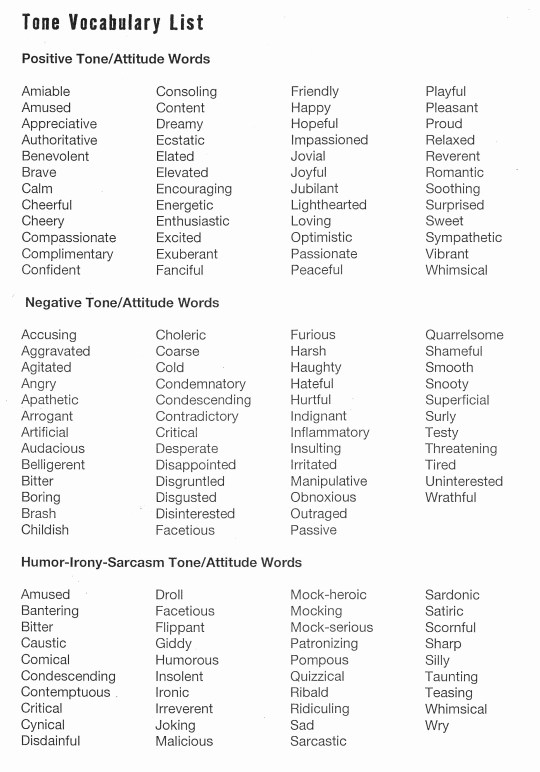
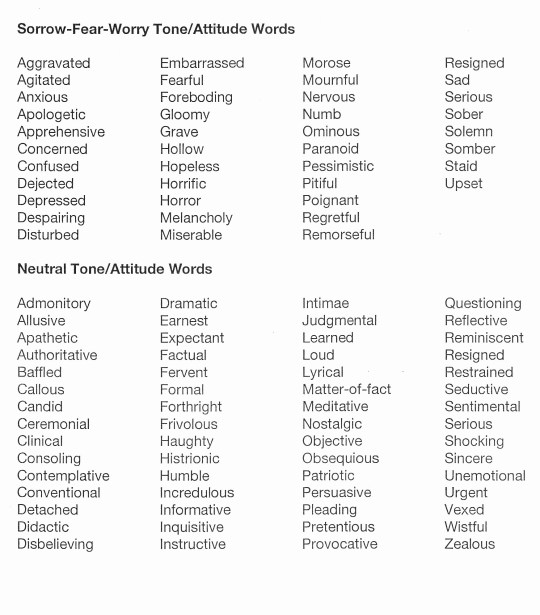
Y’all little writers go on and have fun now
246K notes
·
View notes
Text
Resources For Describing Characters
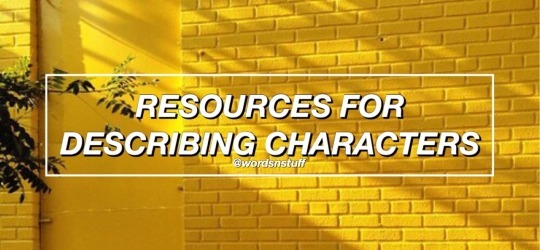
Physical Appearance
Arms
Athletic Build
Back
Butts
Cheeks
Chest
Chins
Curvy Build
Ears
Eyebrows
Eyes
Faces
Facial Hair
Feet
Fingernails
Fingers
Hair
Hands
Head
Hips
Jaws
Knees
Legs
Lips
Muscular Build
Neck
Noses
Shoulders
Slender Build
Sickly Build
Skin
Stocky Build
Stomach
Teeth
Toenails
Toes
Underweight Build
Character Traits
Affectionate
Ambitious
Bossy
Brave
Calm
Cautious
Charismatic
Clever
Conceited
Courageous
Creative
Critical
Curious
Determined
Diplomatic
Dishonest
Disorganized
Eccentric
Excitable
Friendly
Funny
Generous
Glamorous
Guarded
Honest
Impulsive
Independent
Intelligent
Just
Kind
Loyal
Manipulative
Mature
Modest
Mysterious
Naïve
Optimistic
Prejudiced
Persistent
Proper
Responsible
Sensitive
Sentimental
Serious
Shy
Reckless
Stingy
Stubborn
Talented
Thoughtful
Thrifty
Visionary
Wise
Witty
Worry Wart
Wounded
Talents & Skills
A Knack for Languages
A Knack for Making Money
A Way with Animals
Archery
Astral Projection
Astrological Divination
Baking
Basic First Aid
Blending In
Carpentry
Charm
ESP (Clairvoyance)
Empathy
Enhanced Hearing
Enhanced Sense of Smell
Enhanced Taste Buds
Farming
Fishing
Foraging
Gaining the Trust of Others
Gaming
Gardening
Good Listening Skills
Haggling
Herbalism
Hospitality
Hot-Wiring a Car
High Pain Tolerance
Knife Throwing
Knowledge of Explosives
Lip-Reading
Lying
Making People Laugh
Mechanically Inclined
Mentalism
Mimicking
Multitasking
Musicality
Organization
Parkour
Photographic Memory
Predicting the Weather
Promotion
Psychokinesis
Reading People
Regeneration
Repurposing
Sculpting
Self-Defense
Sewing
Sharpshooting
Sleight-of-Hand
Strategic Thinking
Strong Breath Control
Super Strength
Survival Skills
Swift-footedness
Talking With The Dead
Throwing One’s Voice
Whittling
Wilderness Navigation
Wrestling
Elemental Abilities
Miscellaneous
Voices
Voice Types
Speech Patterns
Speech Impediment
List of Character Flaws
List of Archetypes
Hairstyles
Describing Body Types & How They Move Around
Secrets To Give Your Character
Support Wordsnstuff!
Request A Writing Help Post/Themed Playlist/Writing Tips!
Send Me Poetry To Feature On Our Instagram!
Receive Updates & Participate In Polls On Our Twitter!
Like us and share on Facebook!
Read More On Our Masterlist & See our Frequently Asked Questions!
Tag What You Want Me To See With #wordsnstuff!
Participate in monthly writing challenges!
83K notes
·
View notes
Text
how to make yourself write if you don’t know where to start
1. don’t expect too much of yourself
2. write down whatever you know about your idea
3. don’t format it to make it look pretty
4. use paragraphs whenever you get a new idea
5. don’t read back on what you’ve written before
6. if it helps, set your font color to white or light gray
7. don’t skip around. when you have a new idea, it goes on the end of the document
8. write sample dialogue if you have any
9. link to resources you find while googling
10. don’t delete anything. if you want to disregard something, use strikethrough
4K notes
·
View notes
Text
being in love with the process and not the results is one of the healthiest things in the world
93K notes
·
View notes
Text
It’s okay to take breaks from your writing!
It’s okay to decide you aren’t going to work on your wips for a few days.
It’s okay to choose to lower your goals for the month.
It’s okay to pause your rough draft for a week of silly au creation.
It’s okay to ignore everything about your wip for a weekend and binge read something you love.
It’s okay to take take deliberate impromptu breaks.
More than okay: it’s necessary and important to know yourself and your personal mental health and to know when you need to take time off from the things you want to accomplish in order to take care of yourself.
You are the most important part of your writing.
You cannot write unless you take care of you first.
7K notes
·
View notes
